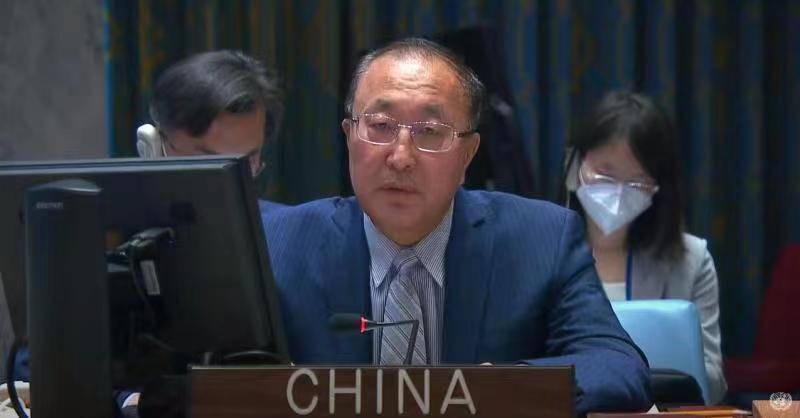| Remarks by Ambassador Zhang Jun at the UN Security Council Briefing on the Situation in the Middle East, including the Palestinian Question |
| 2022-06-27 12:00 |
|
Mr. President, Let me start by thanking Special Coordinator Wennesland for his briefing. The briefing by the Special Coordinator and the Secretary-General’s latest report on the implementation of Resolution 2334 are cause for deep concern on our part over the deteriorating situation in the occupied Palestinian territory. Under the Israeli occupation, Palestine’s viability has been squeezed to the limit. We have noted with great concern that approximately 18% of Area C in the West Bank has been designated by Israel as closed military zone for training, and some 50% has been designated for other purposes, effectively closing it off for Palestinian construction, economic activity and development. In defiance of opposition from the international community, Israel has been entrenched in its plan to advance 4,000 housing units in areas including Kiryat Arba and Shilo, and threatens eviction of 1,200 Palestinians from Masafer Yatta. What is more concerning is that the continued expansion of settlements has encroached upon Palestinian land and natural resources, undermines the right of the Palestinian people to self-determination, and made a geographically contiguous, independent and sovereign State of Palestine ever more elusive to achieve. Every brutal inch of expansion of settlement is making the prospect of a two-state solution much harder to achieve. We urge Israel to stop its contempt for Resolution 2334, stop all settlement activities, and stop further undermining the foundation for the two-state solution. Mr. President, Over the past period, the security situation in the occupied territory has continued to be volatile. We strongly condemn the continued violence by Israeli security forces and the settlers, which has resulted in heavy Palestinian casualties, including children. Six weeks ago, Al Jazeera journalist Shireen Abu Akleh was killed while reporting on ISF operations in the West Bank city of Jenin. The Council expressed is condemnation to this incident in its press statement. We have noted that OHCHR recently pointed out, the shots that killed Abu Akleh and injured her colleague came from Israeli Security Forces. We urge Israel to launch as soon as possible a criminal investigation into this incident, and released its findings in order to ensure accountability, provide justice to the victims, and explain itself in front of the international community. Mr. President, The question of Palestine is a litmus test of the international justice and fairness. A number of member states attended the pledging conference organized by UNRWA last week. That UNRWA has been in operation for over 70 years is an indication of the solidarity of the international community with the Palestinian refugees, but sadly, it also means that the question of Palestine has been without a solution for over 70 years, and that international justice has been denied for over 70 years. UNRWA’s Commissioner-General Mr. Philippe Lazzarini reminded us at the pledging conference that in Gaza, a 12-year-old child has experienced four armed conflicts since birth, and has been living under the blockade in his or her entire life. How to make a generation that has grown up in conflict, violence and blockade to believe in peace and in future? This is a matter that calls for serious attention and consideration from the international community, including this Council. It has been proven time and again that the question of Palestine is the crux of the peace in the Middle East. Piecemeal crisis management cannot substitute for a comprehensive and just settlement. Limited economic and humanitarian measures cannot erase political and security deficit. And individual national policies cannot replace long established international consensus and multilateral process, including resolutions adopted by this Council and the General Assembly one after another. What is needed for the time being is urgent and decisive actions, so as to prevent the train of Palestinian-Israeli situation from totally falling off the track. We call upon the international community, especially those having key influence on the parties concerned, to make genuine efforts for the peace process in the Middle East. This would mean promoting the two-state solution with the utmost urgency, rather than waiting for so-called conditions for dialogue to mature. This would mean adhering to the concept of indivisibility of security, giving equal importance to the security concerns of both Palestine and Israel, rather than allowing tacitly that the security of one side be built on the insecurity of the other. This also means persevering in a responsible attitude, rather than allowing policy flip-flop to further complicate the peace process. In the end, it also means to ditch the double standard and uphold an objective and impartial position, rather than being engaged in long-term practice of setting roadblocks for the Council’s handling of the Palestinian-Israeli question. Mr. President, From June 23 to 24, the leaders of Brazil, Russia, India, China and South Africa held the 14th BRICS Summit and released the Beijing Declaration. In this declaration, the five leaders reaffirmed their commitment to a peaceful and prosperous Middle East and North Africa, called upon the international community to support efforts aimed at the stability and peace in the region. As a responsible member of the international community, China will be always on the side of peace and justice, on the side of human conscience and fairness, and on the right side of history. We will firmly support the just cause of the Palestinian people to restore their legitimate national rights, and will continue to make unremitting efforts for achieving comprehensive, just, and lasting peace in the Middle East. Thank you, Mr. President. |
| |||||||||||||
| |||||||||||||
